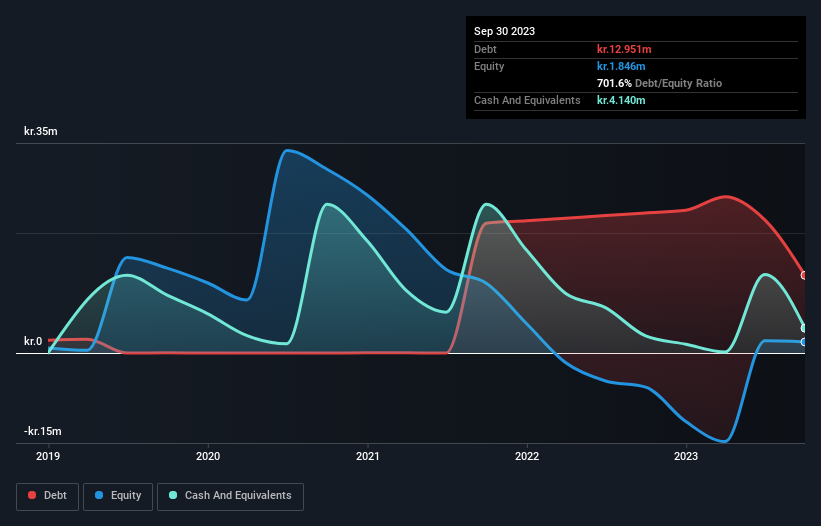Legendary fund manager Li Lu (who Charlie Munger backed) once said, 'The biggest investment risk is not the volatility of prices, but whether you will suffer a permanent loss of capital.' It's only natural to consider a company's balance sheet when you examine how risky it is, since debt is often involved when a business collapses. We note that Konsolidator A/S (CPH:KONSOL) does have debt on its balance sheet. But the real question is whether this debt is making the company risky.
When Is Debt A Problem?
Debt and other liabilities become risky for a business when it cannot easily fulfill those obligations, either with free cash flow or by raising capital at an attractive price. If things get really bad, the lenders can take control of the business. While that is not too common, we often do see indebted companies permanently diluting shareholders because lenders force them to raise capital at a distressed price. Having said that, the most common situation is where a company manages its debt reasonably well - and to its own advantage. When we think about a company's use of debt, we first look at cash and debt together.
Check out our latest analysis for Konsolidator
How Much Debt Does Konsolidator Carry?
You can click the graphic below for the historical numbers, but it shows that Konsolidator had kr.13.0m of debt in September 2023, down from kr.23.3m, one year before. However, it also had kr.4.14m in cash, and so its net debt is kr.8.81m.

How Healthy Is Konsolidator's Balance Sheet?
We can see from the most recent balance sheet that Konsolidator had liabilities of kr.6.49m falling due within a year, and liabilities of kr.15.8m due beyond that. On the other hand, it had cash of kr.4.14m and kr.1.86m worth of receivables due within a year. So its liabilities outweigh the sum of its cash and (near-term) receivables by kr.16.3m.
This deficit isn't so bad because Konsolidator is worth kr.74.1m, and thus could probably raise enough capital to shore up its balance sheet, if the need arose. However, it is still worthwhile taking a close look at its ability to pay off debt. When analysing debt levels, the balance sheet is the obvious place to start. But you can't view debt in total isolation; since Konsolidator will need earnings to service that debt. So if you're keen to discover more about its earnings, it might be worth checking out this graph of its long term earnings trend.
Over 12 months, Konsolidator reported revenue of kr.19m, which is a gain of 14%, although it did not report any earnings before interest and tax. We usually like to see faster growth from unprofitable companies, but each to their own.
Caveat Emptor
Importantly, Konsolidator had an earnings before interest and tax (EBIT) loss over the last year. Indeed, it lost a very considerable kr.13m at the EBIT level. When we look at that and recall the liabilities on its balance sheet, relative to cash, it seems unwise to us for the company to have any debt. So we think its balance sheet is a little strained, though not beyond repair. Another cause for caution is that is bled kr.12m in negative free cash flow over the last twelve months. So suffice it to say we consider the stock very risky. There's no doubt that we learn most about debt from the balance sheet. However, not all investment risk resides within the balance sheet - far from it. For example Konsolidator has 6 warning signs (and 3 which don't sit too well with us) we think you should know about.
At the end of the day, it's often better to focus on companies that are free from net debt. You can access our special list of such companies (all with a track record of profit growth). It's free.
Valuation is complex, but we're here to simplify it.
Discover if Konsolidator might be undervalued or overvalued with our detailed analysis, featuring fair value estimates, potential risks, dividends, insider trades, and its financial condition.
Access Free AnalysisHave feedback on this article? Concerned about the content? Get in touch with us directly. Alternatively, email editorial-team (at) simplywallst.com.
This article by Simply Wall St is general in nature. We provide commentary based on historical data and analyst forecasts only using an unbiased methodology and our articles are not intended to be financial advice. It does not constitute a recommendation to buy or sell any stock, and does not take account of your objectives, or your financial situation. We aim to bring you long-term focused analysis driven by fundamental data. Note that our analysis may not factor in the latest price-sensitive company announcements or qualitative material. Simply Wall St has no position in any stocks mentioned.
About CPSE:KONSOL
Konsolidator
Provides financial consolidation and reporting with user-friendly software in Europe, the United States, and Southeast Asia.
Moderate risk and overvalued.
Market Insights
Community Narratives



